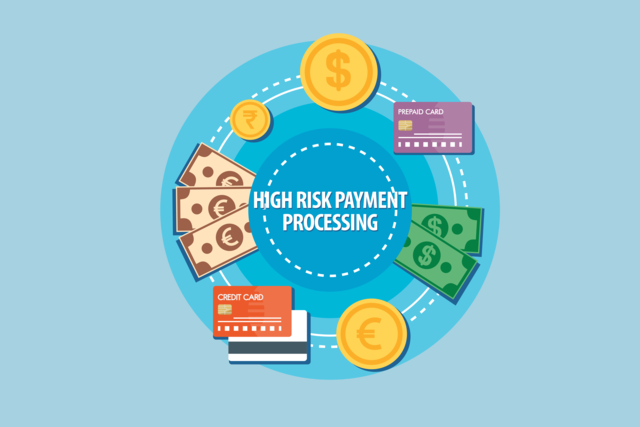AUTHOR : BABLI
DATE : 28/11/23
I. Introduction
A. Definition of High-Risk Credit Card Processing
involves the facilitation of transactions for businesses deemed more prone to financial uncertainties. These businesses often operate in industries with higher chargeback rates or legal complexities.
B. Importance of Choosing the Right Processing Company
Selecting the right company is crucial for the success and sustainability of businesses. The choice impacts transaction costs, security, and the overall financial health of the enterprise.
II. Characteristics of High-Risk Credit Card Processing Companies
A. Industry Types Considered High-Risk
Certain industries, such as adult entertainment(1), travel, and e-commerce(2), are commonly labeled as high-risk due to the nature of their operations.
B. Factors That Label a Business as High-Risk
Factors like a high volume of chargebacks(3), irregular transaction(4) patterns, and legal complexities can contribute to a business(5) being classified as high-risk.
III. Challenges Faced by High-Risk Businesses

A. Higher Fees and Rates
High-risk businesses often face elevated processing fees and interest rates, impacting their bottom line.
B. Stricter Underwriting Process
High-risk credit card processing companies implement a more rigorous underwriting , making it challenging for businesses to secure approvals.
C. Increased Chargeback Risks
Due to the nature of high-risk industries, businesses face a higher likelihood of chargebacks, leading to financial losses.
IV. How to Identify a Reliable High-Risk Credit Card Processing Company

A. Industry Experience
Choose a processor with a proven track record in handling high-risk transactions within your industry.
B. Security Measures in Place
Prioritize companies that implement robust security measures to protect sensitive financial information.
C. Transparent Fee Structure
Opt for a processing company with a transparent fee structure, ensuring no hidden costs surprise you down the line.
V. Top High-Risk Credit Card Processing Companies

A. XYZ Processing Solutions
XYZ Processing Solutions stands out for its extensive experience in catering to high-risk industries, offering customized solutions.
B. ABC Secure Payments
ABC Secure Payments prioritizes security, employing cutting-edge technologies to safeguard transactions for high-risk businesses.
C. PQR Risk Management
PQR Risk Management is renowned for its transparent fee structure, providing clarity for businesses navigating the high-risk landscape.
VI. Tips for High-Risk Businesses to Mitigate Risks
A. Implementing Fraud Prevention Measures
Deploy robust fraud prevention measures to minimize the risk of fraudulent transactions.
B. Regular Monitoring of Transactions
Regularly monitor transactions to identify and address irregularities promptly.
C. Clear Communication with Customers
Establish clear communication channels with customers to address concerns and prevent chargebacks.
VII. Case Studies

A. Success Stories of Businesses with High-Risk Processing
Explore real-life success stories of businesses that thrived in industries with the right credit card processing solutions.
VIII. Common Misconceptions about High-Risk Credit Card Processing
A. All High-Risk Processors Charge Exorbitant Fees
Contrary to popular belief, not all high-risk processors impose exorbitant fees. It’s crucial to research and find a provider with reasonable rates.
B. Limited Options for High-Risk Businesses
While challenges exist, there are reputable companies offering tailored solutions for businesses in various industries.
IX. Future Trends in High-Risk Credit Card Processing

A. Advancements in Security Technologies
Anticipate ongoing advancements in security technologies to further safeguard high-risk transactions.
B. Evolving Regulatory Landscape
Stay informed about changes in the regulatory landscape affecting high-risk credit card processing to adapt and ensure compliance.
VI. Tips for High-Risk Businesses to Mitigate Risks (Continued)
D. Continuous Monitoring of Industry Trends
Stay abreast of industry trends to anticipate changes and proactively adjust your business strategies accordingly.
E. Collaboration with Industry Experts
Forge partnerships with consultants or firms specializing in high-risk industries to gain valuable insights and guidance.
F. Customized Solutions for Unique Challenges
Seek processors that offer customized solutions tailored to the specific challenges faced by your high-risk business.
VII. Case Studies (Continued)
B. Learning from Challenges
Explore case studies that highlight challenges faced by businesses and the strategies they employed to overcome them.
C. The Role of Credit Card Processing in Success
Understand how the right credit card processing played a pivotal role in the success stories of various businesses.
VIII. Common Misconceptions about High-Risk Credit Card Processing (Continued)
C. Researching Individual Providers
Recognize that the fee structures and service quality can vary significantly among high-risk processors, emphasizing the importance of thorough research.
D. Evaluating the True Cost
Consider not just the immediate costs but also the long-term benefits and potential savings that a reliable high-risk credit card processing company can provide.
IX. Future Trends in High-Risk Credit Card Processing (Continued)
C. Artificial Intelligence and Machine Learning Integration
Expect increased integration of AI and machine learning technologies to enhance the accuracy and efficiency of risk assessment in high-risk transactions.
D. Regulatory Technology (RegTech) Advancements
As regulatory requirements evolve, anticipate the rise of advanced RegTech solutions to aid high-risk businesses in maintaining compliance.
X. Conclusion
A. Recap of Key Points
In conclusion, navigating the landscape of high-risk credit card processing requires a nuanced understanding of the challenges, reliable service providers, and proactive risk mitigation strategies.
B. Importance of Informed Decision-Making
Making informed decisions when selecting a credit card processing company is paramount for the success and longevity of high-risk businesses
FAQs
- Q: Are all high-risk credit card processing companies the same?
- A: No, they vary in terms of industry experience, security measures, and fee structures.
- Q: How can high-risk businesses prevent chargebacks?
- A: Implementing robust fraud prevention measures and maintaining clear communication with customers can help minimize chargeback risks.
- Q: Are there affordable options for high-risk credit card processing?
- A: Yes, by researching and choosing wisely, high-risk businesses can find processors with reasonable rates.
- Q: What industries are commonly labeled as high-risk?
- A: Industries such as adult entertainment, travel, and e-commerce are often considered high-risk.
- Q: How can businesses stay updated on the evolving regulatory landscape?
- A: Regularly monitoring industry news and staying in touch with regulatory bodies can help businesses stay informed about changes in the regulatory landscape.





